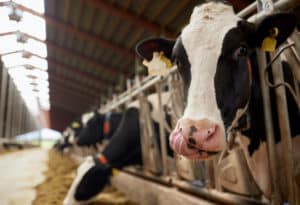Court Overturns Dismissal of Mesothelioma Widow’s Claim Against Dairy Farm
Four years after her husband’s death from malignant mesothelioma, Pamela Shellenberger won a significant jury against the dairy farm that she holds responsible for his illness and death. Though her original personal injury claim against Kreider Dairy Farms was dismissed by the Philadelphia Common Pleas court, she appealed that decision and the Superior Court of Pennsylvania overturned its dismissal.

Mesothelioma Victim Suffered Daily Exposure to Asbestos at Dairy Farm
Richard Shellenberger died of malignant mesothelioma in early 2019. He and his wife Pamela had earlier filed suit against his former employe,r Kreider Dairy Farms, as well as against the manufacturer of asbestos-contaminated products and equipment with which he worked. The couple’s claim was based on his employers’ duty to protect and warn him against the dangers of asbestos at the worksite where he served from 1972 through 1980.
In the deposition testimony that he provided a month before his death, the mesothelioma victim detailed his role in building the dairy processing plant for his employer, and how once the dairy opened and was operating, he was required to blow down the boilers to clean out any “junk” that had accumulated. He also testified that he had to replace the boiler’s asbestos-contaminated gaskets “usually weekly” for eight years.
Pennsylvania Supreme Court Overturns Mesothelioma Decision
The dairy farm filed a successful motion for summary judgment to have the mesothelioma claim against them dismissed, but the widow appealed that decision. She argued that the law said that as her husband’s employer, the dairy farm had owed Mr. Shellenberger a heightened duty of care to provide him with a safe working environment. She asserted that they had breached that duty by exposing him to asbestos on a regular basis, that they knew he was working with asbestos-containing equipment, and that they should have known, with the exercise of reasonable care, that asbestos contained a significant risk to exposed workers.
Though the company argued that they had relied upon others, including the victim, for expertise in their farm’s products and equipment and that they had not been aware of asbestos’ dangers, the Supreme Court cited precedent that read in part, “The knowledge which is required of an employer includes a knowledge of generally known scientific discoveries and inventions applicable to conditions of safety in his business. He is required to inform himself of current advances and of the progress in industries of the same nature as his own…. He is also under a duty to realize the limits of knowledge of those whom he employs, so that he can guard them against dangers which he is required to know, but of which he should know they may be unaware.” They also noted that questions of fact are better decided by a jury. The dismissal of the case was overturned.


FREE Financial Compensation Packet
- Info on law firms that will recover your HIGHEST COMPENSATION
- Learn how to get paid in 90 days
- File for your share of $30 billion in trust funds

